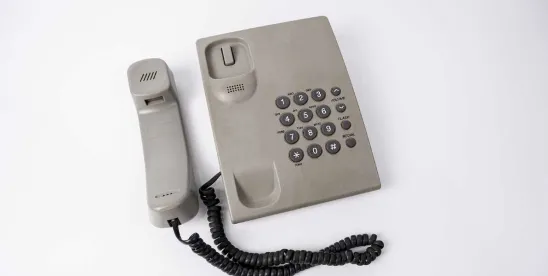So I love reminding everyone how the day Spokeo was decided I predicted it was the end of TCPA class litigation for ever.
Its not that phone calls cannot cause Article III harm–of course they can. Its that there is a gap between the protections of the statute–which prevent uninvited calls–and the substantive harm caused by unwanted calls; i.e. those that are unwanted at the moment (since they, for instance, cause you to fall off a ladder or crash a car when you answer it) or those that are generally unwanted, like scam calls. And since whether a call is unwanted is plainly a subjective fact that cannot be discerned on a classwide basis, TCPA class litigation should be dead.
Of course, the courts have taken their sweet time catching up with me on this analysis.
First courts managed to find there was no gap between the procedural protections of the statute and the substantive right to be let alone. Wrong.
They have finally mostly solved that part but now they land most frequently at determining, in essence, that nobody wants uninvited calls anyway. Wrong.
The most wrong of all, of course, are the Courts that held unnamed class member standing was–somehow–irrelevant to the certification equation. That’s just super wrong but the Eleventh Circuit Court of Appeals mostly fixed that in Cordoba.
Which leads to today’s news–one court has finally got it right. (And it won’t be the last.)
In BARNES, v. ALLSUP EMPLOYMENT SERVICES, LLC, Slip Copy2022 WL 2390715 (S.D. Fl. July 1, 2022) the Court issued a straight ahead denial of certification on predominance grounds based upon the Plaintiff’s inability to prove Article III standing across the class–and that’s just marvelous to see.
For those wondering what I just said, let me break it into pieces:
-
Only people with standing can recover in federal court;
-
Only people who can recover in federal court can be in a class;
-
To certify a class the Plaintiff has to be able to identify who in a class has standing and who does not;
-
While this is often viewed through an “Ascertanability” prong–which is bad, because the Eleventh Circuit killed ascertainability recently–it can also be raised via a showing that Plaintiff cannot prove their case against the entire class on common evidence. And that is a real class action killer.
As noted, many Courts pre-Cordoba failed to recognize the significance of the individualized inquiries triggered by a standing challenge targeted at unnamed class members. But the Barnes court got it absolutely right.
And the key finding that resulted in certification being denied is critical for folks to understand–not every voicemail causes concrete harm.
Indeed, in the Barnes’ court’s view almost no singe voicemail will:
[A]n unanswered phone call that resulted in a voicemail has the same effect as a ringless voicemail because neither event deprives recipients of legitimate uses of their phones. In this case, the unanswered calls did not render the putative class members’ phones unavailable since the class members were not using the phone or ignored the call and used the phone for other purposes. As such, the putative class members were not all deprived of legitimate uses of their phones by the voicemails, and they do not all have standing simply because a voicemail was left on their phones.
Get it? If the party does not answer their phone then they were not harmed by the call. At least not in real time. At least not in the absence of some evidence they were actually doing something that was in some measure disrupted.
The Barnes court found that the named Plaintiff had suffered harm. She had received multiple messages and actually went through the headache of listening to them–getting annoyed everytime she did.
But that is not necessarily the case for all class members:
As Defendant correctly points out, whether other putative class members received multiple phone calls or one phone call is unclear and will require an individualized inquiry. One unanswered phone call that resulted in a voicemail would be insufficient to establish an injury-in-fact, but multiple unanswered phone calls resulting in multiple voicemails would be sufficient to establish an injury-in-fact.
So as a result of the inability to demonstrate who in the class suffered harm, and who did not, the class could not be certified.
This is obviously a huge win for TCPA defendants who are looking to defend their voicemail class actions. It also comes at a time when voicemail and prerecoreded call suits are at an all time high following Facebook.
As you can tell, however, properly leveraging an Article III standing argument via a predominance attack at the certification stage is a nuanced little gambit.
Keeping winning TCPAWorld.




 />i
/>i
